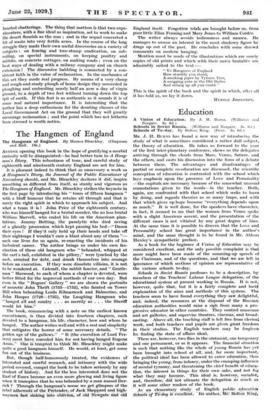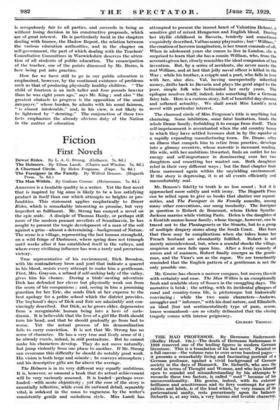Education
MR. J. H. BURNS has found a new way of introducing the study of what is sometimes considered a rather dull subject,
the theory of education. He takes us forward to the year of the first inter-planetary conference, shows us the delegates arriving through the clouds from Mars, Venus, Saturn, and the others, and casts his discussion into the form of a debate between them. The advantages and disadvantages of partial or complete co-education are discussed, the scientific conception of education is contrasted with the school which lays emphasis upon the presence of Love and Personality —the capitals are necessary because of the somewhat unusual connotations given to the words—in the teacher. Both, again, are confronted with that school which seeks to learn by doing, and regards theories as so many traps, and with that which gives up hope because "everything depends upon so much." It is well done, for the speakers have character,, in fact, it seemed to me that the woman from Venus spoke with a slight American accent, and the presentatiOn _ of the different cases is not vitiated by any great degree of bias. At the same time it is possible to discern that the Love and Personality school has great importance in the author's mind, and the same thought is to be found in Mr. Aldoui Huxley's sympathetic preface.
As a book for the beginner A Vision of Education may be considered excellent, and the only possible complaint is that more might have been made of the summing-up speech of the Chairman, and. of the questions, and that we are left in
ignorance of which sections of Opinion are representative or
the various schools to-day.
Schools in Soviet Russia professes to be a description, by members of the Teachers' Labour League delegation, of the educational system at present working in Russia. It is not, however, quite that, but it is a fairly complete and lucid explanation of the aims and methods of this system. The teachers seem to have found everything they saw delightful, and, indeed, the resources at the disposal of the Russian education authorities would raise a sigh from many a pro- gressive educator in other countries. They control museums and art galleries, and supervise theatres, cinemas, and broad- casting. Above all, the teaching staff is left free from clerics; work, and both teachers and pupils are given great freedom in their studies. The English teachers may be forgiven for finding the state of affairs ideal.
There are, however, two flies in the ointment, one temporary and one permanent, or so it appears. The financial situation is such that nothing like the whole of young Russia has yet been brought into school at all, and, far more important, the political ideal has been allowed to enter education, thus bringing the young, from infancy, under the cramping influence of mental tyranny, and threatening the chief benefit of educti- don, the interest in things for their own sake, and not for what they may become. This icTeal .is; however; socialist, and, therefore, did not alienate the delegation as much as
it will some 'other readers of the book.
As an elementary study of English public education
Schools of r4:tclay htexaelleirt. Its aluthof, Bolton Kind, is scrupulously fair to all parties, and succeeds in being so without losing decision in his constructive proposals, which are of great interest. He is particularly lucid in the chapters dealing with finance, the Hadow Report, the relation between the various education authorities,. and in the chapter on, self-government, the part of which dealing with the Teachers' Consultative Committees in Warwickshire deserves the atten- tion of all students of public education. The emancipation of the teacher, one of the points discussed by Mr. Burns, is here being put into practice.
How far we have still to go in our public education is emphasized, however, by the continued existence of problems such as that of producing physically healthy children. " The child of fourteen is an inch taller and four pounds heavier than he was eight years ago," says Mr. King ; and also " the greatest obstacle to progress is the opposition of the small ratepayer," whose burden, he admits with his usual fairness, " is almost intolerable," and, in his view, is not likely to be lightened by " derating." The conjunction of these two facts emphasizes the already obvious duty of the Nation in the matter of education.













































 Previous page
Previous page